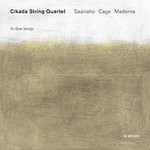
In Due Tempi
 $40.00
Out of Stock
$40.00
Out of Stock6+ weeks add to cart
SAARIAHO / CAGE / MADERNA
In Due Tempi
Cikada String Quartet
[ ECM New Series / CD ]
Release Date: Saturday 10 May 2008
This item is currently out of stock. It may take 6 or more weeks to obtain from when you place your order as this is a specialist product.
"Behind the notes the Cikadas' deeply committed playing reveals glimpses of a dramatic personality that could only be Italian in its lyrical warmth. Riveting stuff."
BBC Music Magazine
"It's extraordinary to think that Nymphea is now almost 20 years old: Saariaho's combination of instruments with live electronics comes up as fresh as ever ... it's the vibrant quality of the playing from Norway's premiere new music quartet - never ugly, even when asked to make extreme demands on the instruments, and always impeccably coloured, balanced and timed. There's colour of a different sort in Cage's Quartet - monochrome that's achieved by playing almost without vibrato. … Maderna's Quartet is the hardest nut to crack, with its fragmented phrases and restless rhythms and dynamics. But behind the notes the Cikadas' deeply committed playing reveals glimpses of a dramatic personality that could only be Italian in its lyrical warmth. Riveting stuff."
Martin Cotton, BBC Music Magazine
"Among the generation of composers that emerged in the second half of the 20th century, Kaija Saariaho has created a unique and adventurous musical voice. Rejecting all musical formats so as to explore the nature of sound, her scores are typified by "Nymphéa", a work for string quartet and live electronics. Dynamics are taken to extremes as Saariaho explores string timbres to form the synthetically produced sound she layers on to the quartet's role. It is a score of tremendous vitality. Sonorities crash into one another with startling impact as Saariaho builds a score of symphonic proportions. In complete contrast, John Cage's String Quartet in Four Parts is texturally slender and at times almost seems to stagnate, the score is so transparent. Finally we have "Quartetto per archi in due tempi" by Bruno Maderna which employs serial technique in its purest form. In direct descent from Webern, its fabric matches the translucency of Cage, with dramatic passages sitting next to brief lyricism: the two composers show the value that silence has as part of their music.
The Saariaho work must be fiendishly difficult to play, but the Cikada Quartet tears into the volatile episodes with a security of purpose that creates razor-sharp rhythms. In the Cage and Maderna compositions we hear the group producing the most imaginative array of subtly shaded, quiet dynamics and the interplay between the different instruments in the second part of the Maderna is one of the disc's many highlights."
David Denton, The Strad
These quartets illustrates three contrasting approaches to form and language. The earliest, John Cage's String Quartet in Four Parts, is a sequence of spare, gestural movements that, typically, forces us to contemplate the nature of sound, silence and space. Bruno Maderna's Quartetto per archi in due tempi, written for Berio, uses as its basis a serial technique that involves not just pitch but duration. It rejoices in refinement but also extremities - here lyrical, there brutal. Kaija Saariaho's single-movement Nymphea for quartet and live electronics was written under the influence of the spectralists Gerard Grisey and Tristan Murail. It's a work of ever varying textures, surfaces, colours. The Cikadas play everything superbly.
Stephen Pettitt, Sunday Times
Tracks:
Kaija Saariaho
Nymphéa
for string quartet and live electronics (1987)
John Cage
String Quartet in Four Parts
Quietly Flowing Along
Slowly Rocking
Nearly Stationary
Quodlibet
Bruno Maderna
Quartetto per archi in due tempi
I
II



